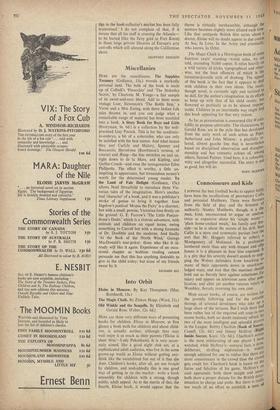Into Orbit
Eloise in Moscow. By Kay Thompson. (Max Reinhardt, 15s.) HERE are three very different ways of presenting books for children. Eloise in Moscow, at first glance a book both for children and about child- ren, is actually neither, although they may well enjoy it as much as their parents ('Eloise is sheer bliss'—Lady Pakenham). It is very accur- ately aimed, like a good night club act, at a sophisticated adult audience, who live in the same grown-up world as Eloise without getting any- think like the uninhibited fun out of it that she does. Children's books, after all, are not bought by children, and undoubtedly this is one good way of getting in on the market: write a book ostensibly for children with a strong, though subtle, adult appeal. As to the merits of this, the fourth, Eloise book, it would appear that the
theme is virtually inexhaustible, although the mixture becomes slightly more diluted each time. Like that centipede British film series about a doctor, Eloise will no doubt appear in due course At Sea, In Love, In the Army and eventualIY, who knows, In Orbit.
The Magic Chalk is a Norwegian book of some fourteen years' standing—world sales, we are told, exceeding 70,000 copies. It relies heavily on a wild variety of tricks, typographical and other- wise, not the least offensive of which is the imitation-juvenile style of drawing. The aPPeal of this book is 'the fact that it appears to deal with children in their own idiom. The result, though novel, is curiously ugly and inclined to be dull, for the author's imagination, in its efforts to keep up with that of his child reader, has flowered so profusely as to be almost imPeue, trable. Children in an inscrutable way might find this book appealing for that very reason.
As far as presentation is concerned Old Winkle fulfils its purpose admirably. The illustrations, by Gerald Rose, are in the style that has developed from the early work of such artists as Sutherland and John Minton : a playfully re- laxed, almost gauche line that is nevertheless based on disciplined observation and draughts- manship and has romantic echoes of, among others, Samuel Palmer. Used here, it is colourful, witty and altogether successful. The story is not as good, but will do. RORY- MCEWEN














































 Previous page
Previous page